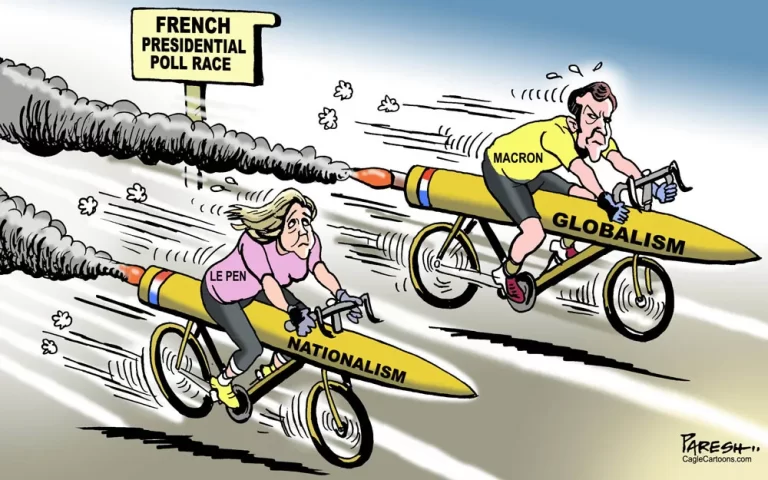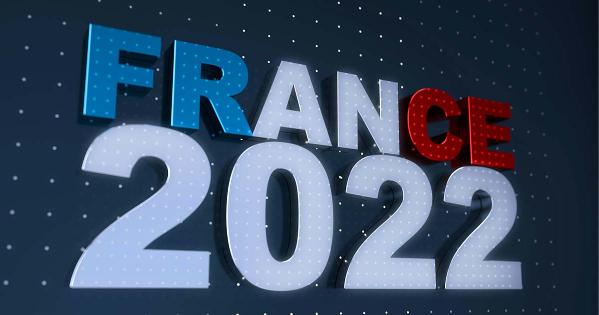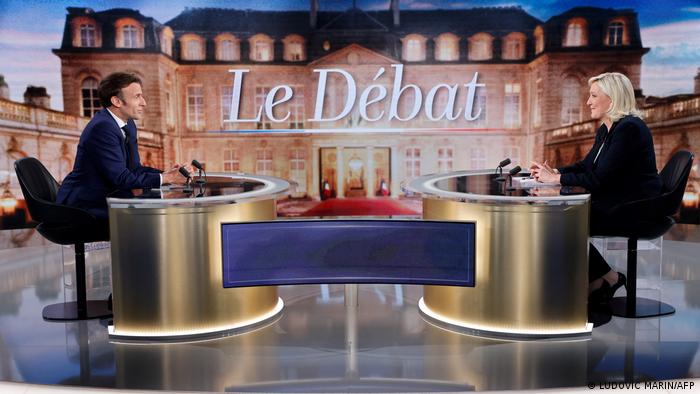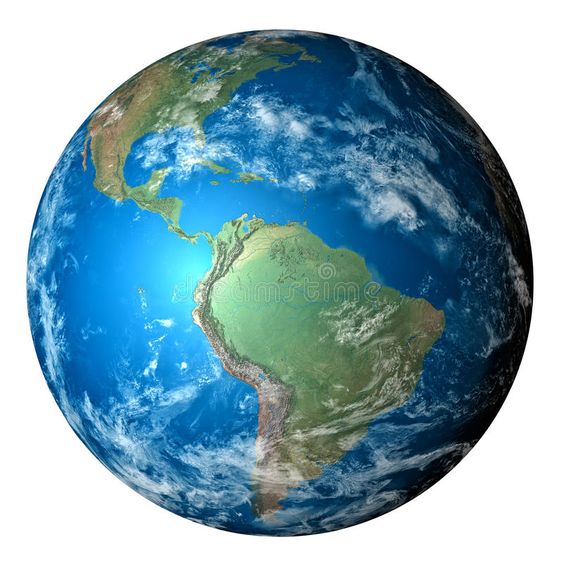
French are less concerned with big picture politics and more concerned with their pocket books, but like it or not, the outcome of the French elections will have a major impact on the big issues in France and rest of the world.
By Tom Arms
The French troop to the polls this Sunday to decide whether they want to turn the clock back to 19th century nationalism with a dash of racism, or opt for European supra-nationalism.
Of course, very few French voters see the choice in those terms. Like most everyone everywhere, they are less concerned with big picture politics and more concerned with their pocket books and the specter of the unknown.
But like it or not, the outcome of the French elections will have a major impact on the big issues in France and—because of France’s international role—the rest of the world.
The choice is clear: a vote for Marine Le Pen is a vote for 19th century nationalism. Support for incumbent Emmanuel Macron is a vote for the continuing trend towards supra-nationalism and a united Europe.
Since the end of World War Two, the world has been moving towards regionalization, globalism and free trade. The European Coal and Steel Community, followed by the Common Market, followed by the EU has been the world’s most successful political expression of that trend. The founders’ aims have been achieved: to bind together the political and economic structures of the European nations so that war becomes “unthinkable and materially impossible.”
The price of this peace and prosperity has been curbs on national sovereignty. A majority of the British people couldn’t stomach it. They also felt that their national identity was threatened. The result was Brexit. Marine Le Pen represents a slice of the French electorate who would favor a Frexit for the same reasons.
The leader of National Rally pushed for a British-style referendum in the 2017 presidential race. She lost that badly and so this time around she watered down her Euro-skepticism. Instead she has proposed everything short of Frexit—withdrawal from the Schengen Agreement, the primacy of French law over the EU, and French state subsidies in contravention of EU regulations. All of which would put France on an early collision course with Brussels and create the conditions for Frexit.
Marine le Pen also dislikes NATO which has been dubbed the most successful military alliance in history. She wants to pull her country out of the integrated military structure. France, she says, should “no longer be caught up in conflicts that are not ours.”
Which brings us to Ukraine, Russia and Ms. Le Pen’s relations with Russia’s Vladimir Putin. In common with most far-right politicians, the leader of National Rally is an admirer of strong autocratic rulers and you don’t get much stronger or more autocratic than Putin. Since the Russian invasion of Ukraine, she has backed away from her support of the Russian leader, but other Western leaders are worried that she would be a weak link in a so far united front against Moscow.
 Like other right-wing populists, Ms. Le Pen uses the fear of immigrant-fueled social contamination and the consequent loss of national identity to win support. Roughly ten percent of the French population is foreign-born. Ms. Le Pen wants to impose a “France for the French” policy and deprive the foreign-born residents of state benefits and use the money saved to distribute to the indigenous French. She also wants to ban the wearing of head scarves by Muslim women which she insists on calling “veils.”
Like other right-wing populists, Ms. Le Pen uses the fear of immigrant-fueled social contamination and the consequent loss of national identity to win support. Roughly ten percent of the French population is foreign-born. Ms. Le Pen wants to impose a “France for the French” policy and deprive the foreign-born residents of state benefits and use the money saved to distribute to the indigenous French. She also wants to ban the wearing of head scarves by Muslim women which she insists on calling “veils.”
The National Rally leader is politically acute enough to know that many of her policies are divisive. That is why she has tried to steer the debate to the cost of living crisis. On this score, President Macron is vulnerable. As the man who has inhabited the Elysee Palace for the past five years he bears responsibility for everything that has happened during his administration. This includes inflation at 4.5 percent; the handling of the pandemic; relations with Russia; proposals to raise the retirement age and all the other baggage of hard decisions that comes with being the person in charge.
But the strongest criticism levelled against Macron is that he is an aloof figure overly-concerned with the interests of the rich and powerful. Ms. Le Pen, in contrast, has projected herself as the champion of the little people.
As for Europe, President Macron, is possibly the most European of the European leaders. He sees the EU as an opportunity rather than threat. It is a vehicle, he argues, through which France can lead the world by leading Europe.

On Wednesday the two candidates met in a head to head television debate. Macron won. He may have appeared aloof but he also demonstrated full grasp of the details. Marine Le Pen was more a candidate of the people but Macron drove a cart and horse through her manifesto. She was particularly vulnerable on her connections with Russia, whose banks have loaned millions of Euros to the campaign coffers of the National Rally.
With only a few days before the second round (24 April), the bookies are giving 10-1 odds in favor of Macron. The opinion polls have him ten points ahead of Marine Le Pen. But even if the incumbent does emerge victorious, the fact that Ms. Le Pen has faced Macron twice in a run-off and improved her performance the second time around, proves that the wider nationalist v supra-nationalist battle will continue to be an issue in France and almost everywhere else.
 World Review
World Review
- The Russians have changed generals as well as shifting the focus of their attack from the north to the east and south. The new man is Lt. General Alexander Dvornikov, aka “the butcher”, a title he earned for his merciless bombardments in the Second Chechen War and Syria. In the first he levelled Grozny and the second left Aleppo a smouldering ruin whose streets were littered with the bodies of civilians. General Dvornikov is wanted for alleged war crimes in Syria and has been blacklisted by the EU. Vladimir Putin has awarded him with the Hero of Russia medal. Dvornikov’s appointment also signals a change in strategy. Previously, daily operations were directed from military headquarters in Moscow. Dvornikov, who has been in Eastern Ukraine for the past two years, is expected to have much more control. His experience is with mechanized artillery units and the terrain of Eastern Ukraine is more suited to his tactics. The north and west of the country is heavily-forested. The south and east is the breadbasket of Europe with wide open plains resembling the American Midwest. His problem is that the Ukrainian military have prepared for his attack with trenches and anti-tank traps. He should also bear in mind that being a general in the Russian army is a dangerous job. The Ukrainians have killed eight so far
- Meanwhile, back on the home front, Vladimir Putin is resorting to the tactics of the man whom he has repeatedly said he admires—Joseph Stalin. The Soviet dictator used a combination of fear, the media, the police and repression to ensure adherence to his policies. Putin is doing the same. The enemy, according to Putin and Russian television, is no longer Neo-Nazis in Kyiv. It is the West “attempting to destroy Mother Russia.” Ukrainians are no longer fellow Slavs awaiting liberation, they are “traitors who deserve only to be ground into the dust.” Also guilty of treason, is anyone who disseminates “fake news” about the “special military operation” in Ukraine (“fake news” is defined as anything other than news that originates in the Kremlin). So far 15,000 people have been arrested for refusing to toe the Putin line. They face up to 15 years in prison. To further keep the lid on the dissidents, authorities are encouraging family, neighbors and friends to inform on each other—another Stalinist tactic. For the moment the strategy is working. Vladimir Putin appears to have the overwhelming support of the Russian public. This may change with a worsening of the economic situation. When Western sanctions were initially imposed the ruble nose-dived and overnight the savings of millions of Russians were wiped out. Since then the central bank has intervened, buying rubles from its reserves. This has blunted the effect of the sanctions and stabilized the currency, but the head of the central bank, Elvira Nabiullina, has warned that this policy is unsustainable beyond the short term. But no matter, President Putin, has decided he wants a result by the 9th of May, the anniversary of the end of World War Two, which means that eastern Ukraine can expect a rough next few weeks.
- Sri Lanka is an economic basket case and is likely to remain so for the foreseeable future. The problem is that the country has run out of foreign currency reserves to pay for vital imports. The cause is partly the result of a drop in tourism because of the pandemic but mainly the result of the policies of President Gotabaya Rajapaksa. He was elected in 2019 with the promise of a “strong hand”. He used that hand to cut taxes and borrow heavily to invest in prestige infrastructure projects. At the time the country’s foreign reserves were $7.6 billion. A year later they were $1.9 billion—and then the pandemic struck and the country’s main foreign currency earner—tourism—came to a sudden halt. To conserve foreign reserves, the government ordered farmers to use home-grown organic fertilizers instead of buying chemical fertilizers from abroad. The result was crop failures and a bigger import bill as Sri Lanka was forced to import food. Most governments respond to such crises by lowering the value of the national currency to make their exports more competitive. Rajapaksa refused to do this, which meant that more reserves were wasted. When the Sri Lankan rupee was finally allowed to float free it plummeted by 30 percent against the dollar in one day. There are no acute shortages of food, clothing, and vital medicines and, of course, energy. Ten of thousands have taken to the streets to demand the resignation of President Rajapaksa and this week one died when police used live ammunition to disperse a crowd. The president has refused to resign. The IMF has been called in to sort out the mess, but their experts say it will be at least six months before they can organize any major loans.
- The Solomon Islands in the South Pacific (population 687,000) is not generally known as one of the world’s diplomatic hot spots. But in the past few weeks that is exactly what it has become. This is because the government of Prime Minister Manasseh Sogarvae has signed a security deal with China which, according to leaked documents, gives Beijing the right to dock warships on the island chain and send security forces to quell anti-government riots which have plagued the islands in recent years. This has sent warning bells ringing in Washington, London and, most of all, Canberra. The South Pacific has been regarded as a Western security zone since shortly after World War Two with the Australians, with some help from New Zealand, holding the fort on behalf of first the British and now the US. Other islands which shelter under the ANZUS umbrella include Papua New Guinea, Tuvalu, Samoa and Tonga. They rely not only on Australian military protection but also on aid and trade. China has been courting all these countries in a bid to break the Australian stranglehold on the region. The deal with the Solomon Islands is seen as Beijing’s first big success.
__________________
 Tom Arms is the Foreign Editor of Liberal Democrat Voice and author of the recently-published book “America Made in Britain.”
Tom Arms is the Foreign Editor of Liberal Democrat Voice and author of the recently-published book “America Made in Britain.”